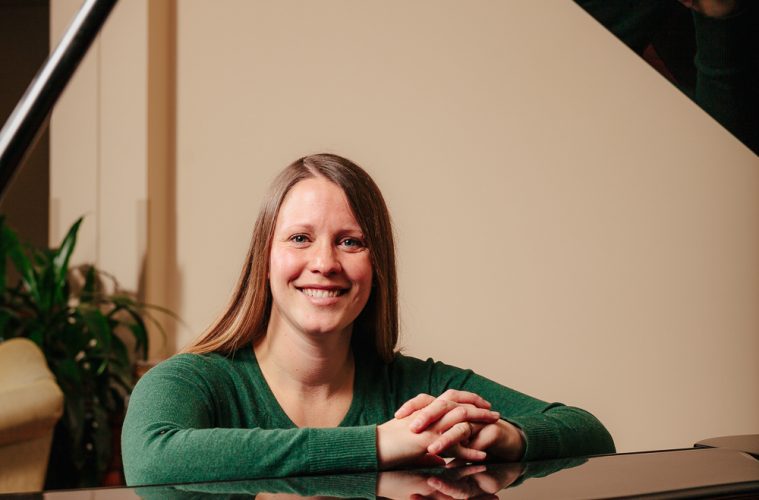Wendy Krueger, director of Up Beat Music Therapy and a board-certified music therapist, recalls working with a man at an adult day program in Brookline. The man’s Parkinson’s disease made him unable to control his legs; he would try to walk across a room and get stuck.
“It was almost as if his feet were glued to the ground,” Krueger says. But the man loved music. “We decided that we would use one song to get [him] moving.”
He chose “When the Saints Go Marching In,” and within seconds of hearing it, “he would be on his feet to get moving, and to the rhythm of the song,” Krueger says. When Krueger wasn’t there, the staff members would sing the song, too, and help him walk.
It may sound like magic, or a miracle, but it’s actually music therapy.
“When people are losing parts of their brains due to a disease, music is something that sticks around,” Krueger says. Although different parts of the brain are responsible for different specific tasks, music is actually processed and performed in all different areas of the brain. So tapping into music can actually help patients clinically. Parkinson’s disease, for instance, is a neurological condition; the man’s legs worked just fine. Music and rhythm helped his brain move his legs.
“Even though one area of the brain might be breaking down more than others, all those other areas are processing music,” Krueger says. “It seems miraculous, but music is so ingrained in our brains, and all over our brains, that it has a completely different effect than anything else.”
After working as a contractor and consultant for a number of years, Krueger started her own company, Up Beat Music Therapy, in 2009. Her work focuses on people with dementia, and she travels across the North Shore and beyond to places like Addison Gilbert Hospital and Seacoast Nursing and Rehabilitation Center, both in Gloucester; Brightview Danvers; Beverly Hospital; and Ledgewood Rehabilitation and Skilled Nursing Center in Beverly.
Every day is different, depending on whom Krueger is working with and their needs. She’ll lead “name that tune” and music trivia games with some groups, which “allows people who don’t think of themselves as musicians to get into a discussion about music.” Writing songs as a group lets patients socialize, and rhythm and motion exercises get people moving. Songwriting and lyric substitution based on what’s going on around them help patients with reality orientation. For instance, if it’s drizzly outside, they might create songs about positive things to do in the rain.
Music can also help break down the barriers of dementia. Even when patients don’t remember the names of their children or what year it is, they still often remember lyrics to songs. And Krueger—who never travels without her guitar—has at least 400 songs committed to memory, including favorites of the people she works with, who range in age from 60 to 100. She says the 60- to 70-year-olds love The Beatles, Bob Dylan, and Peter Paul and Mary; people in their 80s and 90s love Frank Sinatra, Doris Day, Dean Martin, Tony Bennett, Patti Page, and Bing Crosby.
“I watch them pretty closely to find out which songs they’re responding better to,” Krueger says. And her guesses are good, too. For instance, if a patient is 85 and Irish, she might play “When Irish Eyes Are Smiling.”
Krueger says patients’ family members often come to visit during music therapy sessions, when they can connect with their loved ones without having to chat or reminisce. It’s something that she can relate to personally: Her grandmother had advanced dementia while Krueger was studying music therapy in college.
“We could just sing. That helped me to connect with her in a way that I hadn’t been able to before,” Krueger says. It also solidified her love of working with people with dementia. “It’s really all about just being in the music with people.”

